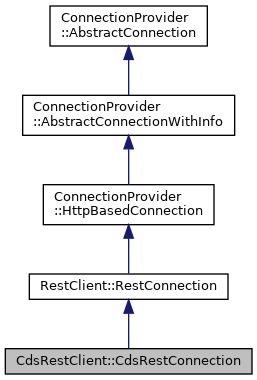 |
Qore CdsRestClient Module Reference
1.0
|
 |
Qore CdsRestClient Module Reference
1.0
|
class for Microsoft Common Data Service REST connections; returns CdsRestClient objects More...

Public Member Methods | |
| constructor (string name, string description, string url, hash< auto > attributes={}, hash< auto > options={}) | |
| creates the CdsRestConnection object More... | |
| DataProvider::AbstractDataProvider | getDataProvider () |
| returns a data provider object for this connection More... | |
| string | getType () |
returns "cdsrest" | |
| bool | hasDataProvider () |
| returns True as this connection returns a data provider with the getDataProvider() method More... | |
Public Attributes | |
| const | ConnectionScheme = ... |
| Connection entry info. | |
Private Member Methods | |
| hash< ConnectionSchemeInfo > | getConnectionSchemeInfoImpl () |
| Returns the ConnectionSchemeInfo hash for this object. | |
| CdsRestClient | getImpl (bool connect=True, *hash< auto > rtopts) |
| returns a CdsRestClient object More... | |
class for Microsoft Common Data Service REST connections; returns CdsRestClient objects
supports the following options:
"api": the API version for CDS"client_id": (required) the Microsoft Common Data Service OAuth2 client ID"client_secret": (required) the Microsoft Common Data Service OAuth2 client secret"connect_timeout": connection timeout to use in milliseconds"content_encoding": this sets the send encoding (if the "send_encoding" option is not set) and the requested response encoding; for possible values, see EncodingSupport"data": see DataSerializationOptions for possible values; the default is "json" "error_passthru": if True then HTTP status codes indicating errors will not cause a REST-RESPONSE-ERROR exception to be raised, rather such responses will be passed through to the caller like any other response"http_version": HTTP version to use ("1.0" or "1.1", defaults to "1.1")"max_redirects": maximum redirects to support"proxy": proxy URL to use"redirect_passthru": if True then redirect responses will be passed to the caller instead of processed"send_encoding": a send data encoding option or the value "auto" which means to use automatic encoding; if not present defaults to no content-encoding on sent message bodies"scope": the OAuth2 scope for the login; the default it to use the target URL + "/.default""tenant": (required) the tenant ID"timeout": transfer timeout to use in milliseconds| CdsRestClient::CdsRestConnection::constructor | ( | string | name, |
| string | description, | ||
| string | url, | ||
| hash< auto > | attributes = {}, |
||
| hash< auto > | options = {} |
||
| ) |
creates the CdsRestConnection object
| name | the name of the connection |
| description | connection description |
| url | connection URL (potentially with password info) |
| attributes | various attributes. See below |
| options | connection options |
See ConnectionProvider::AbstractConnection::constructor() for attributes and options reference.
| CONNECTION-OPTION-ERROR | missing or invalid connection option |
| DataProvider::AbstractDataProvider CdsRestClient::CdsRestConnection::getDataProvider | ( | ) |
returns a data provider object for this connection
|
privatevirtual |
returns a CdsRestClient object
| connect | if True, then the connection is returned already connected |
| rtopts | this connection type does not accept any runtime options, so this parameter is ignored |
Reimplemented from RestClient::RestConnection.
| bool CdsRestClient::CdsRestConnection::hasDataProvider | ( | ) |
returns True as this connection returns a data provider with the getDataProvider() method